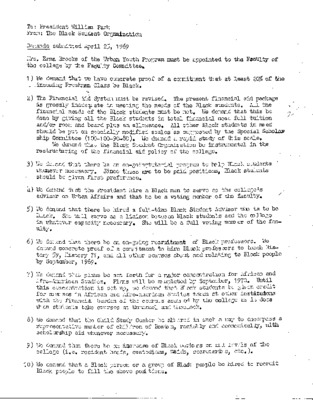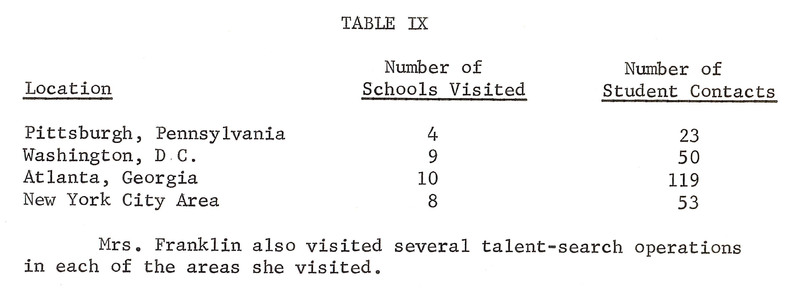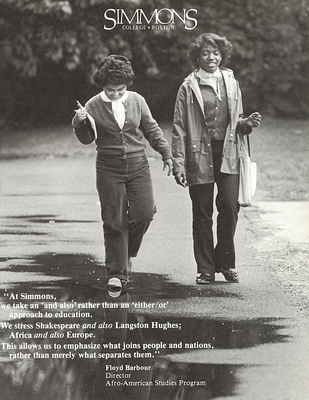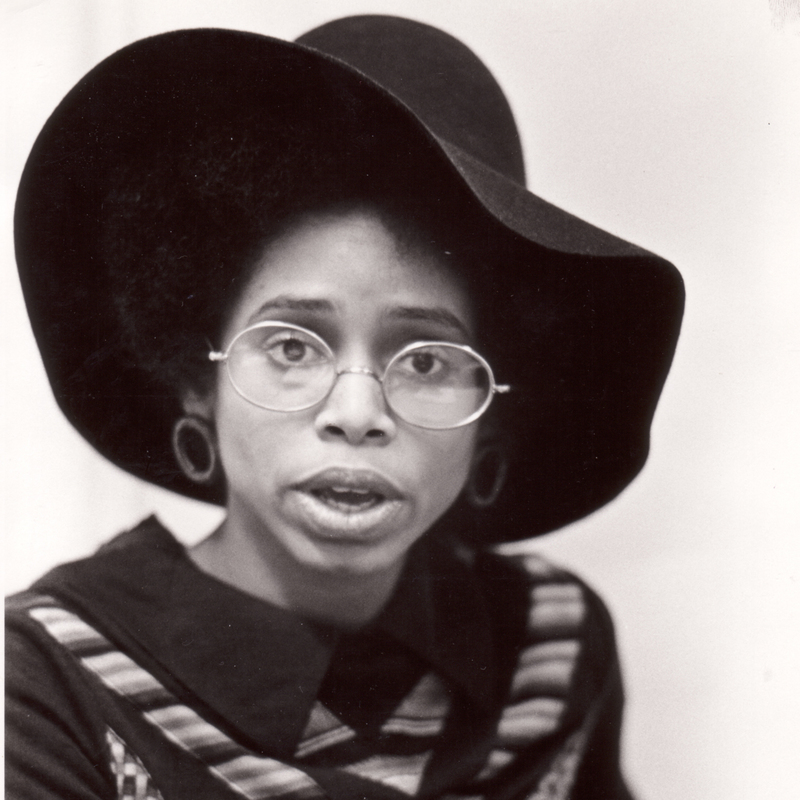The Ten Demands and Administrative Change, 1969-1976
On March 18, 1969, the Black Student Organization published a statement to the faculty called “Reading of Reality.” In the document, the BSO argued that, in the organization’s year and a half of existence, they had been confronted “with many of the same apathetic, paternalistic, and racist attitudes with which Black students on white campuses all over the country are forced to deal in [their] struggle to make [their] educational experience more meaningful.” Throughout the document, the BSO laments the absence of diversity in the curriculum, the lack of financial aid allocated to Black students, and the need for a center in which to keep BSO materials and records. Doubting Simmons’ commitment to the Black community, the document ends, “we feel that it is our right to decide what is meaningful to our lives as Blacks and to work from there.”
These observations solidified into the Ten Demands, presented to President William Park on April 25, 1969. Included among the demands was a call for the increase in recruitment of Black students, professors, and staff members, as well as the creation of an African Studies Program. The BSO also demanded that more financial aid be provided specifically for Black students and that changes be made to the curriculum to include the accomplishment and history of Black Americans. Members of the BSO conducted a sit-in in the President’s Office, refusing to move until President Park agreed to changes in administrative policy. In conjunction, other members of the BSO handed out fliers around campus, discussing the sit-in and the Demands.
On May 7, President Park and the Simmons faculty formally accepted the Ten Demands, beginning sweeping changes to administrative policy. Chief among these alterations included changes to recruitment and financial aid protocols and procedures. Though the Ten Demands pushed for 20% of the incoming class to be Black, it was agreed that this number would make up accepted students, meaning that the incoming class might be of a lower percentage. The Administration Office’s 1968-1969 annual report indicated that recruitment efforts by the Office would be “directed at black students.” Admissions personnel presented at high schools throughout the area in order to attract Black high school students.
The following year, in November 1970, Janus reported that “black representation on campus increased from 8%, or 29 of 378 students in last year’s freshman class, to 12%, or 46 of 374” freshmen. 65% of financial aid that year was also directed toward minority students, a statistic noted in a letter to the Board of Trustees as “unsustainable.” However, despite whether or not the level of financial aid directed to Black students was sustainable, recruitment efforts clearly led to an increase in the number of Black students. During the 1970s, a record 294 Black students graduated from Simmons College.
Simmons College also hired more Black faculty and staff. William Sutton was appointed Vice President for Program Development in September 1970, and his appointment helped to initiate the development of the Black Studies program. Additionally, Sutton participated in the active recruitment of Black employees through all levels of the College. Mary Grigsby was hired as a full-time Black Student Advisor, the administration hired a recruiter, and efforts were made to hire Black professors into the history department to continue teaching courses in African and African American history. The College also formed the Watchdog Committee to report on administrative progress.
Student Highlight:
Born in 1947, Paula Sneed entered Simmons College in 1965. Concentrating in Social Work, Sneed participated in community organizing around the South End, attempting to push back against gentrification. She was also President of the BSO in 1969, when the Ten Demands were presented to President Park. Following her graduation, Sneed attended Harvard Business School, graduating with an M.B.A. Throughout her career, she has held a number of high-ranking positions within Kraft Foods, Inc., including Senior Vice President of North American Food Service Division, Executive Vice President of the Desserts Division, and Executive Vice President of Global Marketing and Resources and Initiatives. She retired from Kraft in 2006. She served on the Simmons College Board of Trustees from 2001 until 2014. Sneed currently serves on the Board of Directors of Berry Global Group, Inc.



